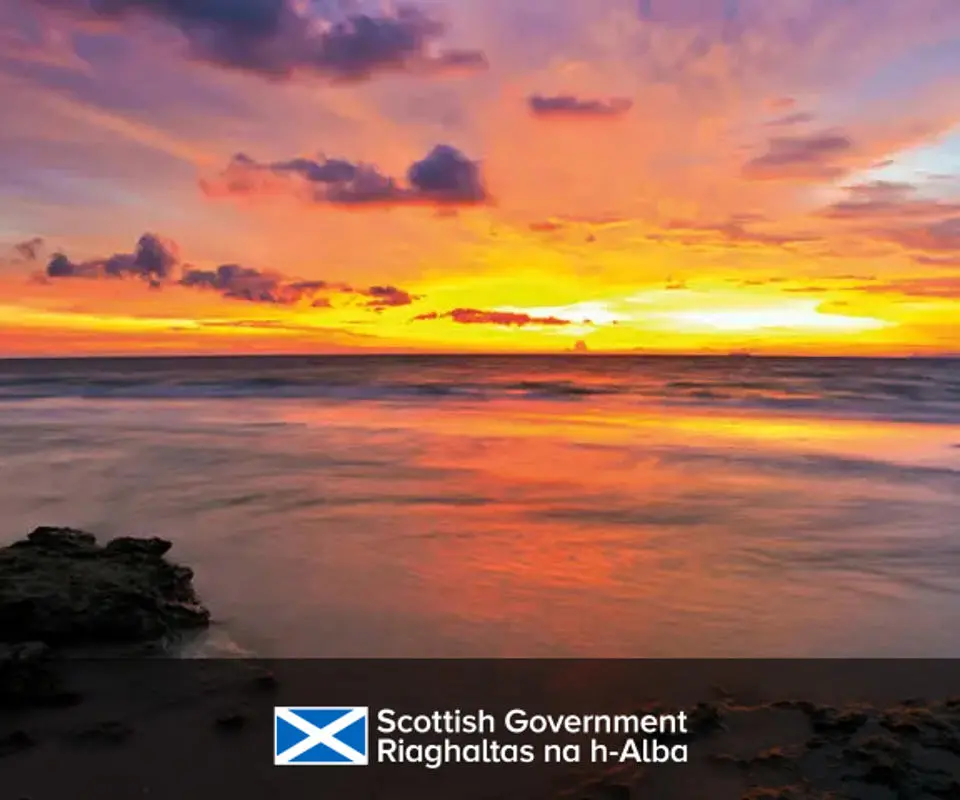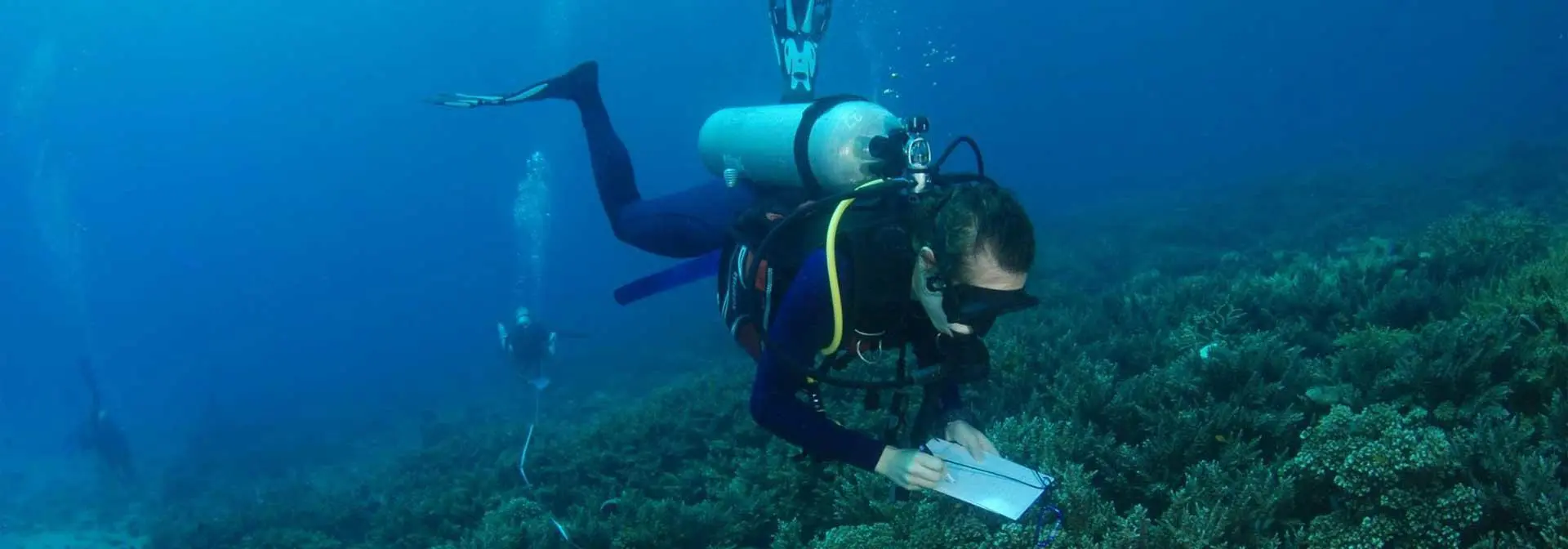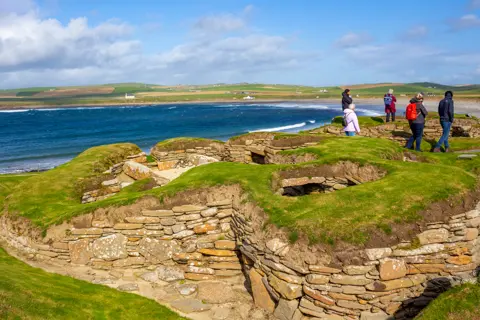Key information
- Level
- Postgraduate Taught
- Delivery type
- Full Time
- Degree qualification
- MSc
- Mode of delivery
- On-Campus
- Duration
- 1 year
- Location
- Orkney
- Start date
- September
MSc International Marine Science provides those of you with a bachelor-level graduate degree in Biology the opportunity to build your marine science knowledge and expertise. For those of you from a different academic background, the programme offers you the opportunity to prepare for employment in the wider international marine management and planning sector, through studying a range of relevant topical issues within this area. You’ll gain a broad knowledge of the fundamental principles, interdisciplinary nature, and innovative international practices in the global marine science field.
You’ll explore marine resources and their sustainable exploitation, and how to use this theoretical knowledge in real-world practical applications. You’ll also consider strategic environmental assessment, policy, legal, ethical and health and safety issues of concern in the marine environment.
The career-focused master’s programme will develop your technical, scientific, and managerial abilities, relevant for a marine science career in academia, industry, government and non-governmental organisations.

The Island Scholarship
The Island Scholarship, delivered in partnership with the Scottish Government and Orkney Islands Council, will help fund the tuition fees for both UK and International Students. The scholarship, subject to budget allocations, is expected to launch soon. In the meantime, we’re inviting students to register their interest — those who do will be the first to be contacted once the scholarship goes live.
Register interestYour student experience
Your learning will be informed by experts in marine science, renewable energy, economics, and transition engineering from our Institute of Life and Earth Sciences (ILES). The Centre for Marine Biodiversity and Biotechnology (CMBB) is based at the Edinburgh campus and the International Centre for Islands Technology (ICIT) in Stromness, Heriot-Watt University’s Orkney campus. These research facilities are part of Heriot-Watt’s School of Energy, Geoscience, Infrastructure and Society (EGIS), which is one of the United Kingdom’s leading institutions for multidisciplinary research and teaching in areas critical to economic development and societal equity.
The research relevance of this postgraduate programme ensures your studies remain innovative and industry focused.
Our published students
Your research dissertation will often be part of ongoing projects and may contribute to publications in peer-reviewed journals — a highly valuable addition to your CV.
Recent examples of our students published work includes:
- Nuala Hanley (MSc International Marine Science Online graduate): Non-invasive detection method for Bonamia ostreae infected Ostrea edulis
- Lukas Baumann: At-sea application of the comet assay to a deep-sea fish
- Naomi Kennon: Rotational fishing enables biodiversity recovery and provides a model for oyster (Ostrea edulis) habitat restoration
- Rebecca Talbot: Macroplastics and Microplastics in Intertidal Sediment of Vinces and Los Tintos Rivers, Guayas Province, Ecuador
Go Global
There are currently no Go Global opportunities for this particular programme. However, other Go Global opportunities may be available. Please contact studywithus@hw.ac.uk for more information.
Course content
September Intake - Orkney
Year 1
Mandatory September
- Applied Research Design and Analysis
- Oceanography
Optional September
- Environmental Processes
- Introduction to Marine Planning
- Marine Renewable Energy Technology
- Marine Resources and Sustainability
- Diversity of Marine Organisms
- Marine Ecotoxicology
- Climate Change, Sustainability and Adaptation
- Transition Engineering - Achieving zero carbon InTIME
- Fisheries Sustainability and Gear Technology
Mandatory January
- GIS for Marine and Environmental Scientists
Optional January
- Tropical and Coral Reefs: Monitoring and Management
- Science Communication and Engagement
- Marine Environmental Monitoring
- Environmental Evidence Synthesis
- Equity, Economics and Ecosystems under Pressure
- Marine Vertebrate Ecology and Conservation
- Renewable Technology Commercialisation
- Energy Transition Lab
- Practical Skills in Marine Surveying
Mandatory May
- ILES Environment Dissertation
Disclaimer
The courses mentioned above may change between now and the time that you study. For more information, please view our Terms and Conditions.
Programme Video
Study at Heriot-Watt University's Orkney Campus
Malaysia field study
Fees and funding
| Status | Full Time |
|---|---|
| UK | £15,200 |
| International | £29,992 |
- Status: Your residency status is usually defined as the country where you have been ordinarily resident for the three years before the start of your course.
- International: 'International' includes applicants from European Union countries who do not hold Pre-Settled or Settled status in UK. (This does not include students from the Republic of Ireland - see above).
Scholarships and bursaries
Postgraduate scholarships and bursaries
We aim to encourage well-qualified, ambitious students to study with us and we offer a wide variety of scholarships and bursaries to achieve this. Over £6 million worth of opportunities are available in fee and stipend scholarships, and more than 400 students benefit from this support.
Postgraduate European Union Scholarship
Open to any student coming from an EU country, this scholarship is an automatically applied £5,000 fee reduction for a full-time postgraduate taught programme at Heriot-Watt University.
Entry requirements
We have standard entry requirements for all of our courses that you will have to meet.
Year 1
A minimum of a 2:2 honours degree or non-UK equivalent in a science subject with evidence of maths/numeracy courses passed at C or experience from a work environment can also be considered. Please include your CV as part of your application.
We welcome applications from international students and accept qualifications from around the world. Please refer to the entry requirements for your country for more details.
English language requirements
If your first language is not English, we'll need to see evidence of your English language ability.
The minimum English language requirement for entry to this programme is IELTS 6.0 (or equivalent) with no score lower than 5.5.
If you do not have IELTS 6.0, we offer a range of English language courses to help you meet the English language requirement for this programme prior to commencing your studies.
Please see our detailed English language requirements.
Why Heriot-Watt
We're the top university in Scotland for graduate outcomes which means that more of our graduates are employed or in postgraduate education than any other institution in the country and we ranked 5th in the UK.
We're also rated number one in the UK for CEO or MD roles, meaning more of our graduates go on to become CEOs or MDs than any other university in the whole of the UK. On top of that, we have beautiful campuses, across the globe, so you'll get a truly international education. Our Edinburgh Campus is home to Oriam, Scotland's National Sports Performance Centre combined with plenty of wellbeing resources, prioritising fitness and mental health for all students. Our Global Research Institutes look at solving real world issues such as climate change and saving our oceans as well as working on the next medical technological breakthrough and the future of AI and robots.
Student life
Explore facilities, and chat to staff and students







